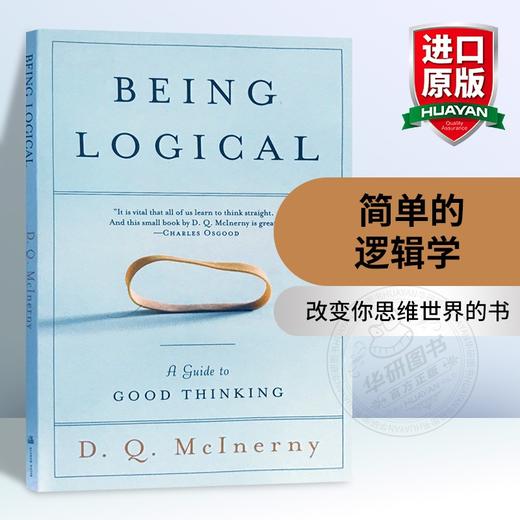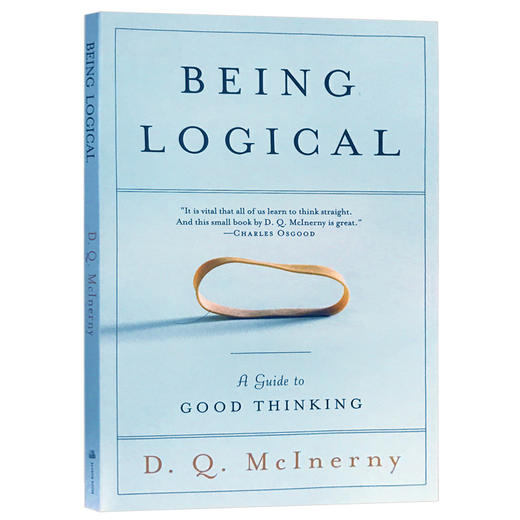正版 简单的逻辑学 英文原版 Being Logical A Guide to Good Thinking 思维导图指南 哲学书逻辑学科普入门书籍
| 运费: | ¥ 0.00-999.00 |
| 库存: | 42 件 |
商品详情
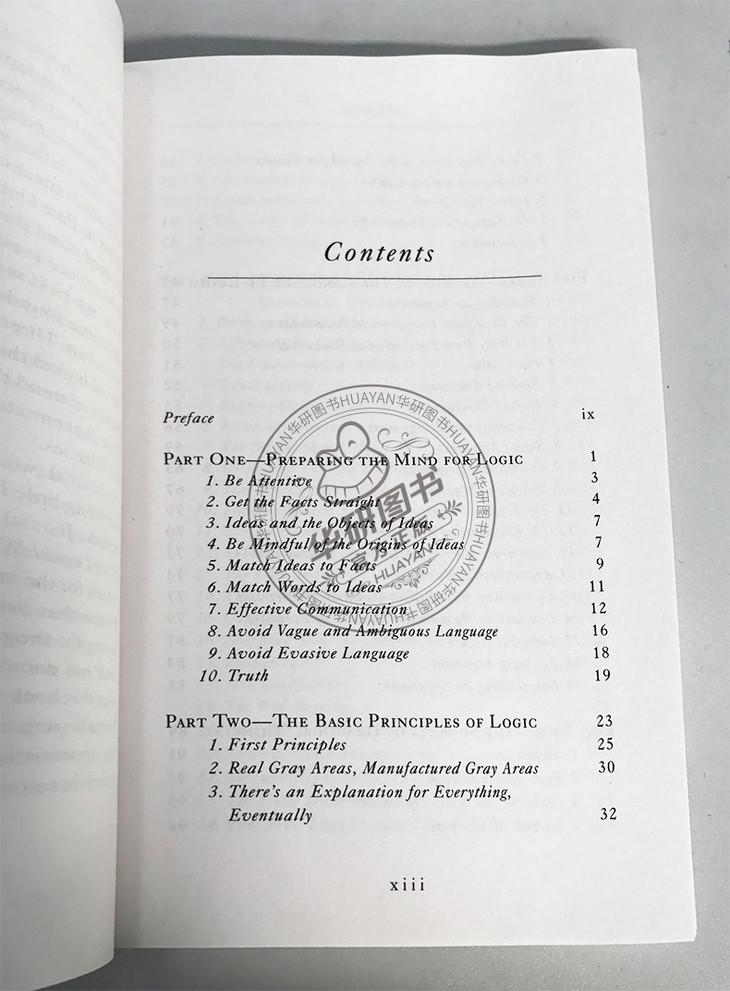
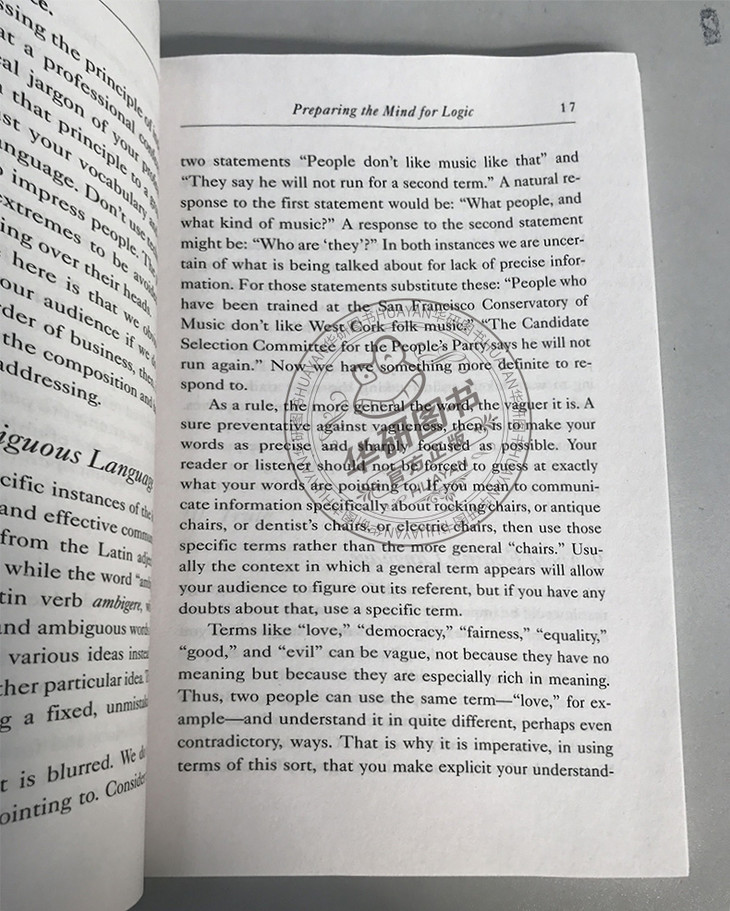
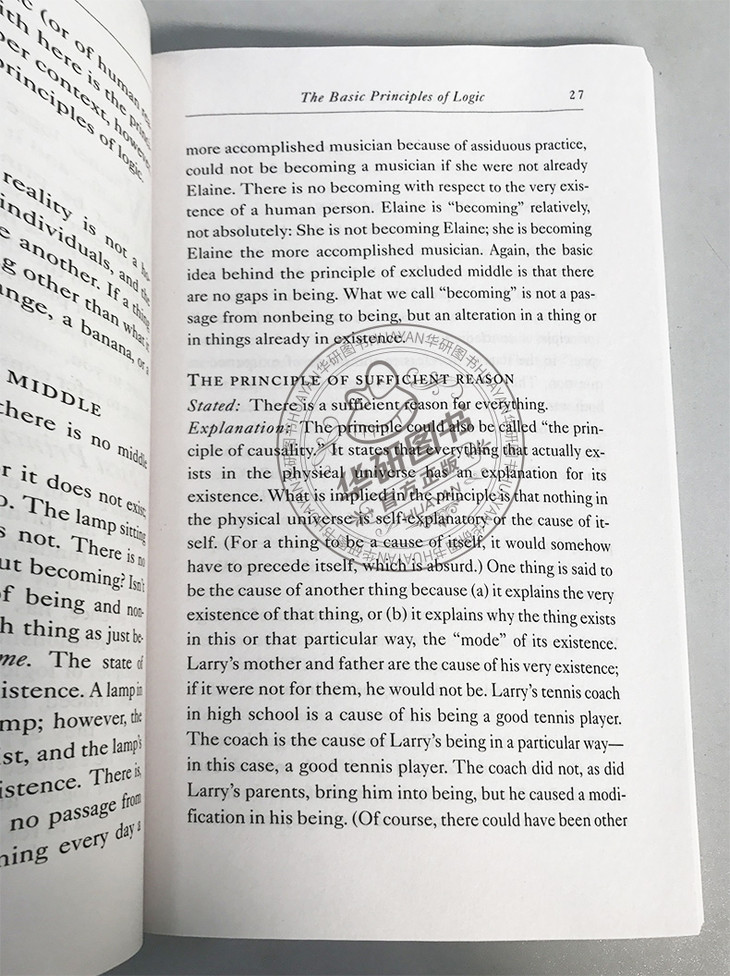
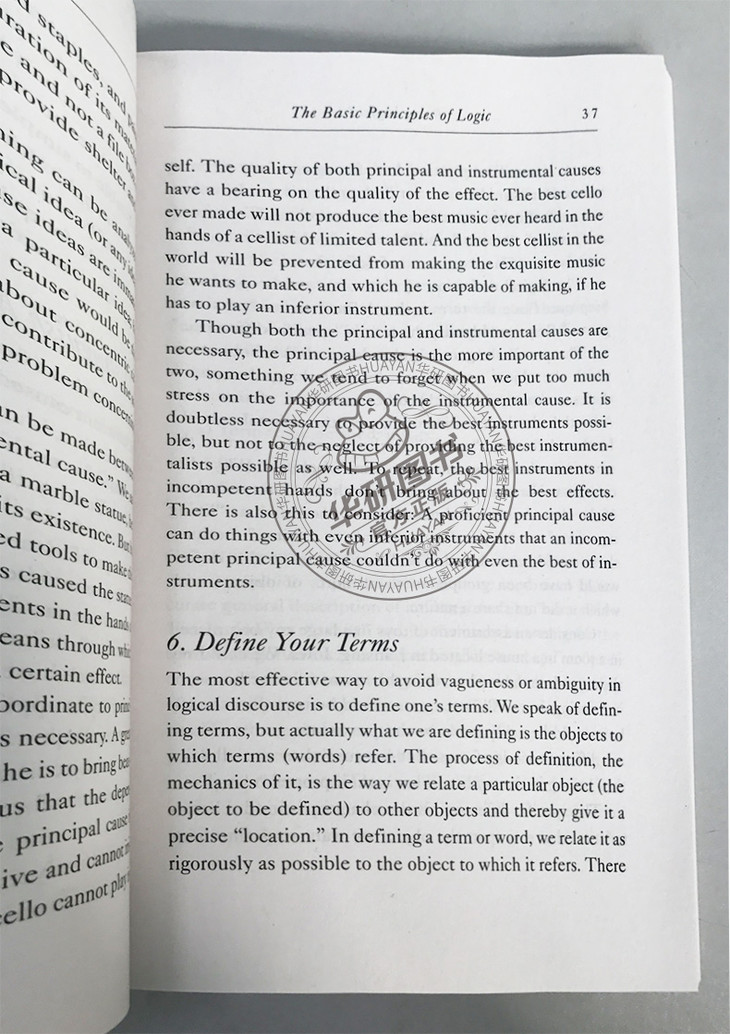

书名:Being Logical: A Guide to Good Thinking 简单的逻辑学
作者:D.Q. McInerny D.Q.麦克伦尼
出版社名称:Random House Trade
出版时间:2005
语种: 英文
ISBN:9780812971156
商品尺寸:13.2 x 1 x 20.3 cm
包装:平装
页数:160

Being Logical《简单的逻辑学》是一本足以彻底改变你思维世界的小书。美国著名逻辑学家、哲学教授D.Q.麦克伦尼,将一门宽广、深奥的逻辑科学以贴近生活、通俗易懂、妙趣横生的语言娓娓道来。它既没有刻板的理论教条,也不是正规的教科书,而是一本必不可多得的现实指南。正如著名行为学家孙路弘所说:《简单的逻辑学》就如一场及时雨,一本治愈社会疾病的宝典,的确是应该人手一册。
作者在书中告诉我们,生活中,逻辑无处不在。无论我们是有意还是无意,逻辑无时不在服务于我们的生活。然而逻辑到底是什么,也许并没有太多的人有很清楚的概念。作者以其简练而又充满趣味的笔触,将逻辑学活化为一种艺术,从它的基本原理,到论证,到非逻辑思维的根源,再到28种就发生在你身边的非逻辑思维形式,带领我们进入这个精彩无比的逻辑世界,体会妙趣横生的思维交锋,跨过无处不在的逻辑陷阱,让你沉醉其中,欲罢不能。
推荐理由:
1.逻辑学科普入门书,成为优秀咨询顾问有五本必读图书之一;
2. 被香港中文大学奉为40本英文经典之一;
3. 被哈佛大学校内书店视为皇冠书籍。
名人推荐:
“逻辑是生活中找寻并满足其愿望的实际工具,没有逻辑,我们的生活将十分沉重,以致几乎是不可能的。”——金岳霖 著名逻辑学家、哲学家、杰出的教育家
“我相信逻辑,比如说,有一个峡谷,所有的人都说过不去,那里是万丈深渊,但如果逻辑推论出那里应该有一座桥,我就会走过去。”——张维迎 著名经济学家、北京大学光华管理学院前任院长
“一切哲学问题经过分析都是语言问题,而语言问题归根结底就是逻辑问题。”——罗素 世界著名哲学家、逻辑学家,诺贝尔文学奖获得者
“当我考入阿姆斯特丹大学时,物理系和哲学系正好在一座楼里,所以我不经意地选修了一门逻辑。对我来说,这门神奇的逻辑课让我大开眼界:正是逻辑揭示了我们所做的日常事情——谈话、推理和论辩背后的精妙。所以我爱上了逻辑学,并为此转到了哲学系。”——约翰·范·本瑟姆 世界著名逻辑学家、荷兰阿姆斯特丹大学逻辑学教授
An essential tool for our post-truth world: a witty primer on logic—and the dangers of illogical thinking—by a renowned Notre Dame professor
Logic is synonymous with reason, judgment, sense, wisdom, and sanity.Being logical is the ability to create concise and reasoned arguments—arguments that build from given premises, using evidence, to a genuine conclusion. But mastering logical thinking also requires studying and understanding illogical thinking, both to sharpen one’s own skills and to protect against incoherent, or deliberately misleading, reasoning.
Elegant, pithy, and precise,Being Logical breaks logic down to its essentials through clear analysis, accessible examples, and focused insights. D. Q. McInerney covers the sources of illogical thinking, from naïve optimism to narrow-mindedness, before dissecting the various tactics—red herrings, diversions, and simplistic reasoning—the illogical use in place of effective reasoning.
An indispensable guide to using logic to advantage in everyday life, this is a concise, crisply readable book. Written explicitly for the layperson, McInerny’sBeing Logical promises to take its place beside Strunk and White’sThe Elements of Style as a classic of lucid, invaluable advice.
Review
“Highly readable... D. Q. McInerny offers an introduction to symbolic logic in plain English, so you can finally be clear on what is deductive reasoning and what is inductive. And you’ll see how deductive arguments are constructed.” — Detroit Free Press
“McInerny’s explanatory outline of sound thinking will be eminently beneficial to expository writers, debaters, and public speakers.” — Booklist
“Given the shortage of logical thinking, and the fact that mankind is adrift, if not sinking, It is vital that all of us learn to think straight. And this small book by D.Q. McInerny is great. It follows therefore since we so badly need it, everybody should not only but it, but read it.” — Charles Osgood

我们知道有些人平时表现得非常聪明伶俐,但是逻辑性却不是很突出。他们有逻辑思考的能力,但是这种能力显然还没有成为本能。造成这种情况的原因,可能是因为他们进行逻辑思考的能力从来没有被系统地培训过,这是他们所受教育中的缺陷。实际上,逻辑学是教育的真正支柱,但是在学校里它却很少被提及。生活中,逻辑无处不在。无论我们是有意还是无意,逻辑无时不在服务于我们的生活。然而逻辑到底是什么,也许并没有太多的人有很清楚的概念。对门外汉或是初学者来说,本书都有切实的帮助。这本书的目的是向读者介绍逻辑学的初步知识和基本技巧。
这是本小书。之所以说它小,一是因为本书确实不厚,与市面上长篇宏论的大部头相比,它确实很小;第二是因为阅读本书并不需要太多的专业知识,可读性很强。其内容并不艰难晦涩,作者尽可能采用直白的语言来解释逻辑中的基本原理、观点、产生谬误的原因、谬误的形式等等基础的逻辑问题。
逻辑,作为一个整体,是个宽广、深奥、精彩纷呈的领域,这本书既没有刻板的理论论述也不是正规的教科书,这是一本现实应用的指南,对那些初次接触逻辑的人介绍逻辑的基本原理。《简单的逻辑学》期待造就实践者,而不是理论家。
本书将逻辑分为五部分,就是书中的五个章节,每一章节以前一章节的知识为基础。第一章是准备,为成为一个逻辑思考者而要搭建的必要思想框架。第二三章是逻辑的核心,如何建立正确的逻辑思考。第二章阐述了引导逻辑思考的基础事实,第三章重点是“论证—逻辑思考”的外在表现形式。第四章,探讨导致非逻辑思考的态度及思维模式。后一章,第五章围绕“谬误—非逻辑思考”的细节展开。
Whether regarded as a science, an art, or a skill–and it can properly be regarded as all three–logic is the basis of our ability to think, analyze, argue, and communicate. Indeed, logic goes to the very core of what we mean by human intelligence. In this concise, crisply readable book, distinguished professor D. Q. McInerny offers an indispensable guide to using logic to advantage in everyday life. Written explicitly for the layperson, McInerny’sBeing Logical promises to take its place beside Strunk and White’s The Elements of Style as a classic of lucid, invaluable advice.
As McInerny notes, logic is a deep, wide, and wonderfully varied field, with a bearing on every aspect of our intellectual life. A mastery of logic begins with an understanding of right reasoning–and encompasses a grasp of the close kinship between logical thought and logical expression, a knowledge of the basic terms of argument, and a familiarity with the pitfalls of illogical thinking. Accordingly, McInerny structures his book in a series of brief, penetrating chapters that build on one another to form a unified and coherent introduction to clear and effective reasoning.
At the heart of the book is a brilliant consideration of argument–how an argument is founded and elaborated, how it differs from other forms of intellectual discourse, and how it critically embodies the elements of logic. McInerny teases out the subtleties and complexities of premises and conclusions, differentiates statements of fact from statements of value, and discusses the principles and uses of every major type of argument, from the syllogistic to the conditional. In addition, he provides an incisive look at illogical thinking and explains how to recognize and avoid the most common errors of logic.

D.Q.麦克伦尼,美国知名逻辑学家、哲学教授,从事教学多年,曾先后任教于圣母大学和肯塔基大学。现居住于内布拉斯加州林肯市。
D. Q. McInerny has taught logic to college students for decades at Notre Dame, the University of Kentucky, and Our Lady of Guadalupe Seminary in Lincoln, Nebraska. A scholar of Thomas Merton and the recipient of two PhDs, Professor McInerny lives in Lincoln, Nebraska.

PartOne
Preparing the Mind for Logic
Being logical presupposes our having a sensitivity to language and a knack for its effective use, for logic and language are inseparable. It also presupposes our having a healthy respect for the firm factualness of the world in which we live, for logic is about reality. Finally, being logical presupposes a lively awareness of how the facts that are our ideas relate to the facts that are the objects in the world, for logic is about truth. In this first part of the book I will discuss those attitudes, points of view, and practical procedures whose adoption prepares the mind for a successful engagement with logic.
1. Be Attentive
Many mistakes in reasoning are explained by the fact that we are not paying sufficient attention to the situation in which we find ourselves. This is especially true in familiar situations. That very familiarity causes us to make careless judgments about facts right before our eyes. We misread a situation because we are skimming it, when what we should be doing is perusing it. Often, we assume that a familiar situation will be but a repeat performance of a similar situation we’ve experienced before. But, in the strictest sense, there are no repeat performances. Every situation is unique, and we must be alert to its uniqueness.
The phrase “to pay attention” is telling. It reminds us that attention costs something. Attention demands an active, energetic response to every situation, to the persons, places, and things that make up the situation. It is impossible to be truly attentive and passive at the same time. Don’t just look, see. Don’t just hear, listen. Train yourself to focus on details. The little things are not to be ignored, for it is just the little things that lead us to the big things.
2. Get the Facts Straight
A fact is something made or done. It has clear objective status. It is something we respond to as having an independent status all its own. It is naggingly persistent, demands recognition, and can be nasty if ignored.
There are two basic types of objective facts, things and events. A “thing” is an actually existing entity, animal, vegetable, or mineral. The White House is an example of the first type of fact, and the assassination of Abraham Lincoln of the second. The first type is more basic than the second because events are made up of things or of the actions of things. A state dinner is to be held at the White House. Such an event could not take place were it not for the existence, first and foremost, of the fact that is the White House, and countless other facts as well. In order to establish the factualness of an event, any number of concrete things need to be appealed to.
To determine the reality of a fact that is a thing, all you need do is pay it a visit. If it actually exists it must be somewhere, and, assuming its place to be accessible to you, you can verify its factualness by direct observation. Take the case of the White House. To ascertain its being a fact, rather than purely imaginary, you can travel to Washington, D.C., and there see the White House with your own eyes. That is the most direct and reliable way to establish its factualness. But you could also rely on indirect evidence: For example, by taking the word of a trustworthy eyewitness that the White House is indeed in Washington, D.C. Or you could decide that photographic evidence is sufficient to establish factualness.
But what about an event like Lincoln’s assassination? We say that is a fact. What is the justification for that claim? It is an event that is over and done with, and there are no living witnesses to the event whom we might consult. Obviously, we did not ourselves witness the event, so direct evidence is out of the question. In this case our approach will be to acquaint ourselves with a variety of things that serve as indirect evidence of the event. For example, we would consult official documents (police reports, the death certificate, etc.), newspaper accounts, photographs, memoirs, diaries, and items in the Congressional Record, all of which are facts in their own right and whose only reasonable explanation is the factualness of Lincoln’s assassination. On the basis of the factualness of these things, we establish the factualness of the event. And we thus establish a historical fact.
Facts can also be thought of as objective or subjective. Both things and events are objective facts. They exist in the public domain and are in principle accessible to all. A subjective fact is one that is limited to the subject experiencing it. A headache would be an example of a subjective fact. If I am the one experiencing the headache, then I have direct evidence of its factualness. But if it is you experiencing the headache, I can establish its factualness only indirectly. I must take your word that you have a headache. Establishing the reality of subjective facts depends entirely on the trustworthiness of those who claim to be experiencing them.
- 华研外语批发分销官方旗舰店 (微信公众号认证)
- 本店是“华研外语”品牌商自营店,全国所有“华研外语”、“华研教育”品牌图书都是我司出版发行的,本店为华研官方源头出货,所有图书均为正规正版,拥有实惠与正版的保障!!!
- 扫描二维码,访问我们的微信店铺
- 随时随地的购物、客服咨询、查询订单和物流...
